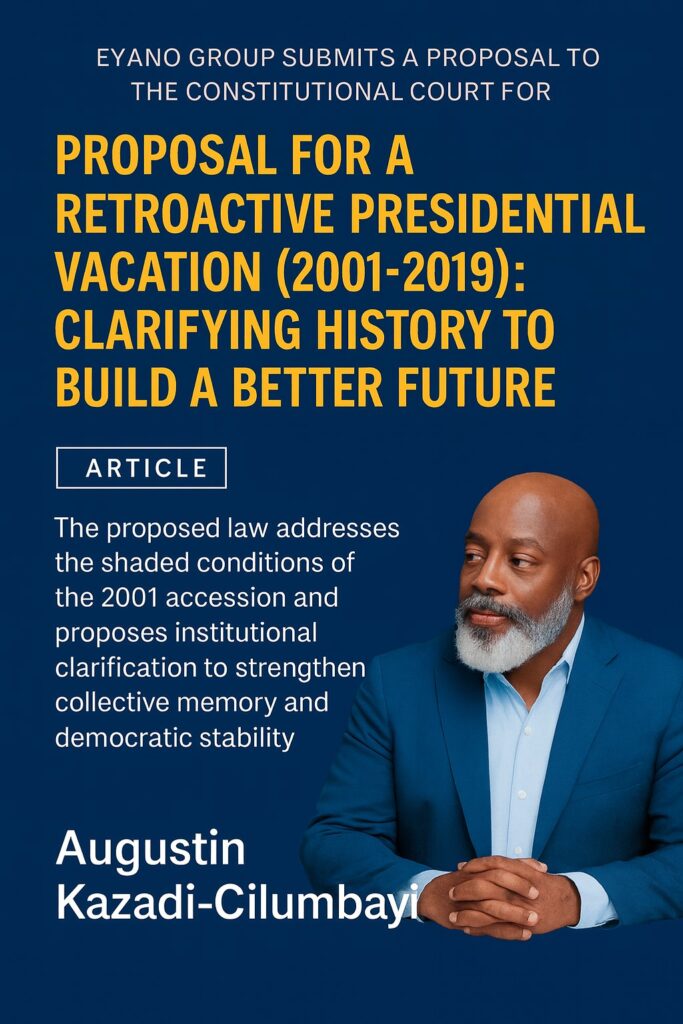Introduction
The Democratic Republic of Congo is once again at a historical crossroads. Recent judicial revelations have reopened the debate on one of the most contested chapters in the country’s modern history: the accession to power in 2001.
Following the assassination of the sitting president, a successor was introduced under opaque circumstances. For nearly two decades, debates over his legitimacy and identity overshadowed national politics, leaving behind a legacy of doubt.
In response, Eyano Group has officially submitted a proposed law on retroactive presidential vacancy (2001–2019) to the Constitutional Court. This initiative aims to legally clarify the period, provide a clear institutional record, and transform this legacy of uncertainty into a lesson for future generations.
1. January 2001: A transition in the shadows
The tragic death of the Head of State in January 2001 threw the country into turmoil. Within days, a successor was presented.
Yet the conditions surrounding this succession were far from clear:
- No transparent parliamentary consensus was reached.
- Institutions were weakened by war and lacked authority.
- Citizens received no explanation of the procedures followed.
This lack of clarity marked the beginning of an era of governance that would last 18 years.
2. The unresolved identity debate
Beyond the institutional process, the successor’s true identity became one of the most divisive issues.
Although publicly presented as the late president’s son, many inconsistencies emerged:
- Conflicting testimonies about his early life.
- A fragmented educational and military record.
- Lack of conclusive evidence proving the claimed lineage.
Recent judicial proceedings confirmed long-standing suspicions, recognizing that the 2001 succession was built on contested nationality and unclear identity.
3. Eighteen years of contested legitimacy
From 2001 to 2019, the country lived under the authority of a leader whose legitimacy was constantly questioned.
- The 2006 and 2011 elections were heavily disputed.
- Oversight institutions were weakened and politicized.
- Popular trust in the government deteriorated sharply.
This prolonged era, born from ambiguity, undermined the credibility of democratic institutions.
4. Eyano Group’s proposed law: an institutional response
Faced with this history, Eyano Group has formally filed before the Constitutional Court a proposed law on retroactive presidential vacancy (2001–2019).
The proposal pursues three main objectives:
- Historical clarification – legally acknowledge that the 2001 succession failed to meet constitutional standards of transparency.
- Collective memory – provide future generations with an official account of this contested period.
- Institutional prevention – ensure that no leader ever rises to power again under such unclear conditions.
5. Connecting with judicial revelations
The recent verdict against the former head of state strengthens the relevance of this initiative.
The court confirmed accusations of illegal accession and grave violations of national law.
The proposed law by Eyano Group complements this judgment by offering a permanent legal framework:
- Officially recognize the retroactive vacancy between 2001 and 2019.
- Define this era as an institutional anomaly.
- Transform judicial conclusions into a national civic lesson.
6. Benefits of the law
If adopted, the law would bring significant benefits:
- Restoring public trust: proving that the nation can admit mistakes and correct its record.
- Reinforcing constitutional legitimacy: ensuring that the supreme law of the land is binding in all circumstances.
- Educating future leaders: law students and scholars would have a clear, documented case study.
- Guaranteeing stability: preventing future disputes over contested accessions to power.
7. A national and democratic debate
By being submitted to the Constitutional Court, the proposal creates room for a broader national dialogue:
- Parliamentarians will examine, debate, and refine it.
- Universities will study its implications.
- Citizens will find long-awaited answers to decades of doubt.
It is a step toward a more transparent, inclusive, and responsible democracy.
8. Lessons from other countries
Congo is not alone in addressing contested transitions.
- In Africa, retroactive laws reclassified certain regimes as “transitional” rather than legitimate mandates.
- In Latin America, truth commissions documented illegal successions.
- In Europe, constitutional revisions clarified irregular successions after crises.
By adopting this law, the DRC would join a universal movement: clarifying history to secure the future.
Conclusion
The proposed law on retroactive presidential vacancy (2001–2019), submitted by Eyano Group to the Constitutional Court, is an act of institutional maturity.
It does not erase the past—it clarifies it. It does not seek revenge—it educates and prevents.
By officially recognizing that the 2001 succession occurred under obscure conditions and contested identity, the DRC shows it is capable of learning from history.
This is a law of memory, of pedagogy, and of prevention.
It will allow future generations to say: we lived through a period of uncertainty, but we chose to clarify it so that it will never happen again.
✍️
Augustin Kazadi-Cilumbayi
President & Chief Executive Officer
Eyano Publishing
📧 contact@eyanoexpress.com
📞 US/Canada: +1 800 955 0153 | International: +1 613 882 0555
🌐 www.eyanoexpress.com
